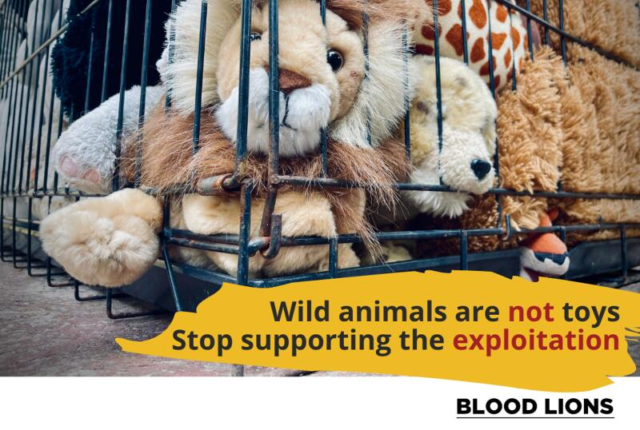A statement by Blood Lions Campaign said currently 8,000 to 10,000 lions and thousands of other big cats, including tigers and cheetahs, are bred and kept in captivity in approximately 350 facilities in South Africa.
THE CAMPAIGN manager of Blood Lions Dr Louise de Waal said the public can create a change in the commercial captive lion breeding industry by not supporting the exploitation of these wild animals.
De Waal was speaking as the world commemorates World Lion Day on Wedneday in celebration of one of Africa’s most iconic species and to raise awareness on conservation issues globally.
Lions are recognised worldwide for their importance not only from a nature conservation and ecological perspective, but also symbolically, culturally and in terms of tourism.
A statement by Blood Lions Campaign said currently 8,000 to 10,000 lions and thousands of other big cats, including tigers and cheetahs, are bred and kept in captivity in approximately 350 facilities in South Africa. These predators are bred for commercial purposes, including cub petting, voluntourism, canned hunting, the lion bone trade and live exports.
In honour of World Lion Day, a short video clip was produced by Blood Lions to highlight one stage in the exploitative cycle, namely the cub petting, where thousands of tourists and volunteers pay to play with, bottle feed and hand-raise captive-bred predator cubs.
These unsuspecting tourists and volunteers are made to believe that their money will contribute to the conservation of wild lions and that the cubs they interact with will be returned to the wild, said the statement.
The campaign said despite the announcement in May last year by the Minister of Forestry, Fisheries and the Environment (DFFE), Barbara Creecy, that South Africa will no longer breed captive lions, keep lions in captivity, or use captive lions commercially, the captive lion industry is still thriving.
“This legislative process is ongoing and in June 2021, a draft Policy Position paper was gazetted for public participation on the conservation and ecologically sustainable use of elephant, lion, leopard and rhinoceros.
“Last month, a draft White Paper was released for public comment on the Conservation and Sustainable use of South Africa’s Biodiversity. Although both documents have the potential to make a positive impact on reversing the domestication and commercialisation of our wildlife, it will take significant time to amend and promulgate national legislation based on these documents,” said the campaign.
De Waal said in the meantime, the commercial captive lion breeding industry was allowed to continue.
“You can, however, be part of creating change … What would our children say if they knew the truth? You can stop supporting the exploitation of wild animals and help us to #CancelCaptivity,” she said.
“Should you find yourself at a facility with captive predators and any of the following ‘Red Flags’ are raised, we recommend not supporting that facility”:
- If you are allowed to touch, hold or feed any cubs or adult predators.
- If the place always has cubs for people to play with.
- If there are always cubs, but hardly any adult predators living there.
- If you know that they are breeding predators.
- If you know that they are buying or selling predators from/to other places and/or people.








